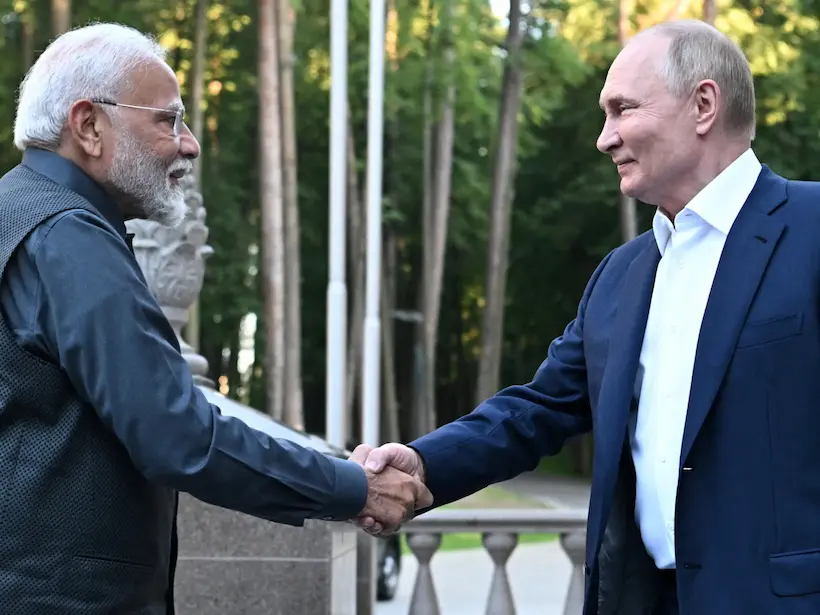
The Putin India Visit Marks a Pivotal Moment of Strategic Defiance Amid Rising US Trade Hostility
A Visit Laden with Global Implications
Putin India Visit is a Bold Strategic Game-Changer – In a world increasingly shaped by shifting alliances and economic brinkmanship, Russian President Vladimir Putin’s anticipated visit to India later this year is more than a diplomatic formality, it’s a geopolitical statement. As tensions between India and the United States escalate over energy trade and punitive tariffs, Putin’s presence in New Delhi signals a recalibration of global power dynamics. The visit comes at a time when Washington has imposed a staggering 50% tariff on Indian exports, citing New Delhi’s continued purchase of Russian oil despite Western sanctions.
The Tariff Flashpoint: US-India Trade Tensions
President Donald Trump’s recent executive order slapping additional tariffs on Indian goods has sent ripples through global markets. The move, aimed at pressuring India to sever its energy ties with Russia, has been met with firm resistance from New Delhi. India’s Ministry of External Affairs condemned the tariffs as “unfair, unjustified, and unreasonable,” asserting that national interest and energy security will not be compromised.
Prime Minister Narendra Modi, speaking at the MS Swaminathan Centenary International Conference, made it clear: “India will never compromise on the interests of farmers, fishermen, and dairy farmers.” This defiant stance underscores India’s commitment to an independent foreign policy, even as it navigates the complexities of global diplomacy.
The Oil Equation: Strategic Energy Choices
At the heart of the dispute lies India’s continued import of Russian crude oil. Since the Ukraine invasion in 2022, Western nations have sought to isolate Moscow economically. However, India has maintained that its energy purchases are driven by pragmatic considerations. With global oil prices fluctuating and domestic demand surging, Russian oil offers a cost-effective solution that supports India’s economic stability.
India’s position is not just about economics, it’s about sovereignty. By refusing to bow to external pressure, New Delhi is asserting its right to chart its own course in international affairs.
India and Russia: A “Time-Tested” Partnership
Putin’s visit is expected to reinforce the longstanding strategic partnership between India and Russia. From defense cooperation to energy collaboration, the two nations share a multifaceted relationship that dates back decades. One of the most defining moments came during the 1971 Indo-Pak war, when Russia backed India against US intervention, a historical precedent that still resonates in diplomatic circles.
Despite growing ties with the US through platforms like the Quad, India continues to describe its relationship with Moscow as “steady and time-tested.” Putin’s visit will likely include discussions on defense procurement, nuclear energy collaboration, and joint ventures in space and technology.
Defense Diplomacy: Beyond Oil and Trade
India and Russia have long been defense partners, with Russia supplying a significant portion of India’s military hardware. From Sukhoi fighter jets to S-400 missile systems, the defense relationship is robust and evolving. Putin’s visit could pave the way for new agreements in defense manufacturing, joint exercises, and technology transfer.
In the current climate, where India faces pressure from Western allies to reduce its reliance on Russian arms, reaffirming this partnership sends a clear message: India will not be dictated to.
Global Realignment: Multipolar World in Action
Putin’s visit also reflects a broader trend—the emergence of a multipolar world. As traditional alliances fray and new coalitions form, countries like India are increasingly asserting their autonomy. The deepening India-Russia engagement is part of a larger realignment that includes BRICS expansion, Eurasian connectivity projects, and alternative financial systems that bypass Western dominance.
India’s balancing act, maintaining ties with both the US and Russia, is emblematic of its strategic maturity. Rather than choosing sides, New Delhi is crafting a nuanced foreign policy that prioritizes national interest over ideological alignment.
Strategic Timing: Why Now?
The timing of Putin’s visit is no coincidence. With the US ramping up economic pressure and global tensions simmering, the visit serves multiple purposes:
- Diplomatic Defiance: A signal to Washington that India will not be coerced.
- Economic Assurance: Strengthening energy and trade ties with Russia to offset tariff impacts.
- Geopolitical Messaging: Reinforcing India’s role as a sovereign power in a fragmented world order.
Domestic Optics: Modi’s Calculated Gamble
For Prime Minister Modi, hosting Putin is a calculated political move. It reinforces his image as a leader who stands firm against external pressure and prioritizes national interest. With elections on the horizon, the optics of defiance and strategic autonomy play well domestically.
Moreover, the visit allows Modi to showcase India’s global relevance—positioning the country not as a passive recipient of global trends, but as an active shaper of them.
Challenges Ahead: Navigating the Fallout
While the visit promises strategic gains, it also comes with risks. The US-India relationship, which has flourished in recent years, could face turbulence. Trade negotiations may stall, defense cooperation could be reevaluated, and diplomatic friction may intensify.
India will need to tread carefully—leveraging its strategic partnerships without alienating key allies. This requires deft diplomacy, clear communication, and a firm commitment to national priorities.
Conclusion: A Defining Moment in Global Diplomacy
Putin’s upcoming visit to India is more than a bilateral engagement, it’s a defining moment in global diplomacy. As the world grapples with economic nationalism, energy insecurity, and geopolitical fragmentation, India’s response will shape its role on the world stage.
By welcoming Putin amid a tariff storm, India is making a bold statement: it will pursue its own path, guided by national interest, strategic autonomy, and a vision for a multipolar future.
Also read –
Defiant Allies: Russia and India Challenge Trump’s Tariff Threat
Strategic Autonomy or Defiance? India’s Bold Response to US Pressure Over Russian Oil
1 thought on “Why the Putin India Visit Is a Bold Strategic Game-Changer Amid the Explosive US Tariff Row”
Comments are closed.